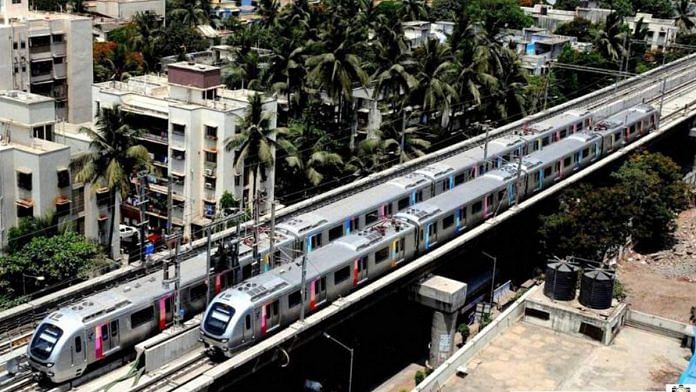Mumbai: Mumbai Metropolitan Region (MMR), which comprises India’s financial capital and a smattering of satellite towns, has received a big push this election season, with the Devendra Fadnavis-led Maharashtra government setting aside Rs 16,909 crore for infrastructure projects in the urban agglomerate.
Nearly half of this year’s allocation for MMR is meant for metro rail projects, with at least a third aimed at pushing two much-delayed showpiece projects — a trans-harbour link between Mumbai and Navi Mumbai, and a multi-modal corridor.
The budget, approved by Fadnavis late Wednesday evening, ushers the state into a crucial poll year that will see elections to both the Lok Sabha as well as the Maharashtra assembly.
This is the highest-ever budget for the MMR, and marks a 39 per cent increase over the allocation of Rs 12,157 crore for 2018-19, and an over four-fold spike since 2015-16, the first full fiscal year of the Fadnavis government, when the budget was Rs 3,830 crore.
Mumbai & satellites
The MMR is to Mumbai what the National Capital Region is to Delhi — spread over 4,355 sq km with a population of more than 20 million, it includes Mumbai and the satellite towns of Greater Mumbai, Thane, Kalyan-Dombivali, Navi Mumbai, Ulhasnagar, Bhiwandi-Nizamapur, Vasai-Virar and Mira-Bhayandar.
According to the 2011 Census, its population has been growing at a higher rate than that of the state’s capital city — at 12.22 per cent, as compared to Mumbai’s 3.87 per cent.
Transport infrastructure and connectivity between the various areas of the MMR continue to be poor, with most of these centres connected to Mumbai by over-burdened suburban railway lines, which carry 75 lakh passengers daily, 2.6 times their capacity.
Speaking to ThePrint, MMRDA commissioner R.A. Rajeev said the authority’s budget “will keep increasing now with every passing year”.
“Earlier, we used to always have a surplus budget. But it is a crime to have public money and not use it. We have now moved towards a deficit budget,” he added.
Also read: Mumbai moves to get past its creaky, colonial local train network with new metro lines
Metro works
So far, only an 11.4-km Metro line, commissioned by the former Congress-NCP government, is operational in Mumbai, running between the areas of Versova and Ghatkopar since 2014.
Six more, approved under the Fadnavis government are under construction and five more are in various stages of planning. Overall, the total length of all Metro lines will come to 276 km.
One of Fadnavis’ earliest promises after taking charge as CM was to create a Metro network of more than 100 kilometres in Mumbai in five years.
In his first year, he revisited the entire Metro master plan and tweaked the proposed corridors in a way that they could be completed at the earliest.
In his fifth year now, the allocation of funds for Metro work is at an all-time high of Rs 7,486.5 crore, almost 60 per cent more than last year’s Rs 4,700 crore, of which the authority spent Rs 3,211 crore, as of figures up to January.
Of the total budget for Metro work, the highest allocation is for two lines — one from Dahisar to DN Nagar and another from from Dahisar East to Andheri East — that are scheduled to be completed by July 2020.
Push to much-delayed showpiece projects
The Fadnavis-led MMRDA also allocated Rs 3,000 crore for the much-delayed Sewri-Nhava Sheva Mumbai Trans-Harbour Link, a crucial connector for the proposed Navi Mumbai International Airport.
The construction of the project, touted to comprise the country’s largest sea-link, started in September 2018 after several false starts over four decades.
In 2018-19, the MMRDA had budgeted for Rs 2,101 crore, of which it had spent Rs 1,951 crore as of January.
Fadnavis has also allocated Rs 2,250 crore for a project, which has been on the drawing board for 15 years — a 126-km Multi Modal Corridor from Virar to Alibaug, two corners of the Mumbai Metropolitan Region. The authority had planned to spend Rs 500 crore on the project last year, but ended up spending Rs 7.20 crore.
“We started land acquisition for the project last year. Land acquisition will still go on this year, but we still plan to start execution of the project this year,” MMRDA spokesperson Dilip Kawathkar said.
Also read: This IAS officer is trying to change the perception that Mumbai Metro 3 is a ‘demonic’ plan



